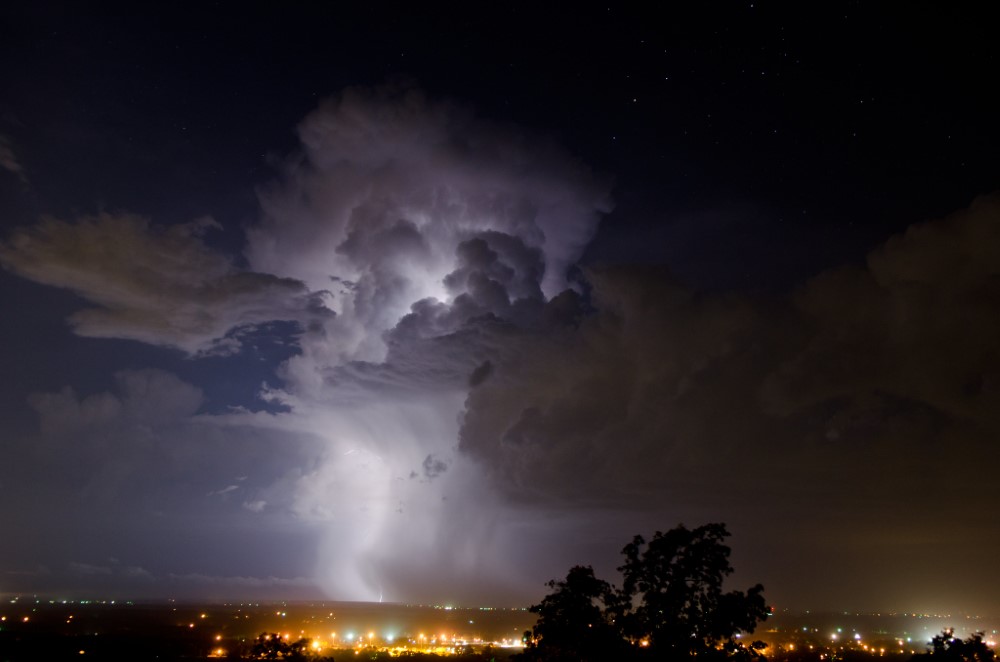An American Meteorological Society Media Resource

Photo: NOAA on Flickr
People attending and planning summer events should be aware of weather hazards including lightning, wind gusts, extreme heat, hail, flooding, tornadoes, and hurricanes, all of which have caused event-related fatalities or injuries. Recent examples include:
- 80-90 people injured by hail at Colorado’s Red Rocks Amphitheatre in June of 2023.
- One dead and 40 injured when a tornado brought down the roof of the Apollo Theatre in Belvidere, Illinois, in April 2023.
- 17 fans at an Ed Sheeran concert in Pittsburgh in July 2023 taken to a hospital due to extreme heat.
According to the AMS Statement on Weather Safety at Events and Public Gatherings:
“Each year, millions of Americans invest time and money to attend sporting, entertainment, and recreational events at venues ranging in size from intimate parks to large fairgrounds and stadiums. Attendees are typically focused on the entertainer, activity, sports team, or event at hand, and less so on their surroundings. Situational awareness can be compromised when hazardous weather threatens, and in the worst of cases, loss of life has occurred. In addition, at many indoor events, and almost all outdoor events, sheltering options against life-threatening weather are limited or nonexistent. In the U.S., hazardous weather kills attendees at entertainment venues each year, and litigation in these instances exceeds tens of millions of dollars.”
This resource sheet contains links to useful information from the American Meteorological Society to help you communicate to your audience about summer weather safety or severe weather occurring during summer events.
Weather-Safe Events
The AMS Statement on Weather Safety at Venues and Public Gatherings notes successful weather safety practices for event planners, including the following:
- Having a professional meteorologist forecast and monitor the weather.
- Following NOAA guidelines to implement an integrated warning team.
- Having a responsible, trained professional in charge of making weather-related decisions.
- Generating (and updating) a weather plan in advance.
- Designating nearest safe structures and allowing ample time for patrons to reach these locations when needed.
Creating plans and mechanisms to communicate weather risk to organizers and patrons.
Summer Weather Definitions
These peer-reviewed atmospheric science definitions from the AMS Glossary of Meteorology can help you outline summer weather hazards for your audience.
Thunderstorm | Lightning | Tornado | Hail | Squall | Tropical Cyclone/Hurricane | Heat Wave | Flood | Rip (current) | Rain | Precipitation | Fire Weather
Search additional meteorology terms with the AMS Glossary.
AMS Severe Summer Weather Experts
Below are some AMS members who are experts on topics relevant to summer weather/event safety. To reach these and other experts, please contact [email protected].

Amber Liggett
Communications Specialist (Contractor)
NOAA Climate Program Office
Weather, Emergency Management, Climate Literacy

Paul Markowski
Distinguished Professor of Meteorology
Penn State University
Tornadoes, Thunderstorms, Severe Weather

Jared Rennie
Research Meteorologist
NOAA NCEI
Extreme Heat, Climate Impacts.
Other AMS Resources
AMS positions on weather safety topics, informational resources, and more below.
AMS Statements: The AMS provides position and information statements on relevant topics in the weather, water, and climate space. In addition to our Statement on Weather Safety at Venues and Public Gatherings, you can view AMS Statements on:
- Lightning Safety
- Best Practices for Severe Weather Safety for Pre-K through Grade 12 Children at School
- Best Practices for Large Retail Outlets in Preparation for Severe Wind and Tornado Emergencies
- Best Practices for the Dissemination of Weather Warnings to the Public
AMS Hurricanes Media Resource Sheet: AMS experts, meteorological definitions, statements, and other useful information about hurricanes.
AMS Weather Band: Weather Band webinars offer perspectives from researchers and meteorologists. For example, hear from Detroit Tigers consultant meteorologist Paul Gross about weather, climate, and baseball, including how game-delay decisions are made. Webinars are free to join, and recordings are publicly available after three months.
Other Resources
NOAA’s Weather-Ready Nation program offers public awareness material on summer weather safety, from beach safety to summer heat, in multiple languages.
Ready.gov is a campaign from the U.S. government providing resources to help individuals prepare for and respond to disasters. They offer guides on severe weather, floods, extreme heat, hurricanes, wildfires, and many other hazards.
The National Weather Service offers Weather Safety tips for a variety of weather. The NWS Storm Prediction Center shows current weather warnings, advisories, and watches in effect; and the near-term outlook for convective storms and fire weather. NWS Heat Risk provides a forecast of potential heat-related impacts across the United States.
AMS and Summer Weather Safety
The AMS is the professional society for weather, water, and climate science and services. AMS members include (among others) weather forecasters; broadcast, digital, and consulting meteorologists; atmospheric science researchers; local and regional emergency managers; and professionals working within federal agencies including the National Weather Service and the Federal Emergency Management Agency. Our journals regularly publish research into all types of weather, climate, and hydrological phenomena.
The AMS has numerous advisory committees related to summer weather safety, including the Committee on Emergency Management, Committee on Effective Communication of Weather, Water, and Climate Information, Committee on Atmospheric Electricity, Committee on Severe Local Storms, Committee on Tropical Meteorology and Tropical Cyclones. The AMS regularly holds conferences on Severe Local Storms, Hurricanes and Tropical Meteorology, Weather Warnings and Communication, and more.